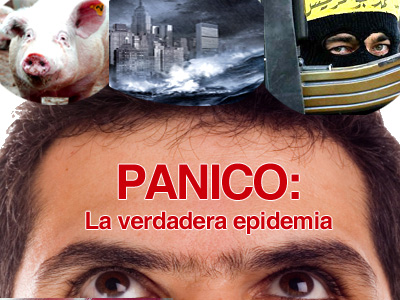
Swine flu. Economic depression. Global warming. Terrorism and crime. End of humanity! News media (television, radio, newspapers, internet) have been very successful in scaring most people about a lot of things, the latest being swine flu.
I was at a great Cinco de Mayo event in Oakland’s Fruitvale district last weekend with fantastic food and entertainment. The event organizers did a great job, but not many people attended. I knew that news media had made swine flu a big story and the small crowd at the event was more evidence of the resulting fear. Restaurant owners have recently told me that business has slowed noticeably since the swine flu became a big story. And many parents are keeping their children from going to school. I believe that the public reaction to swine flu fear is unnecessary, but it’s no different from the other fears that are put on us everyday.
As of May 6, the death toll from swine flu in Mexico is 44 people. In a nation of 100 million people! If you read beyond the headlines, health experts say the swine flu is no more serious than the usual flu viruses. But look at the impact: closed businesses and schools, people wearing masks and avoiding each other - a lot of unnecessary fear. In the United States, there are two confirmed deaths and both people already had weak immune systems, according to the Center for Disease Control (CDC). These deaths are sad, but what makes me angry is how the news exploits such deaths. We should pay attention to swine flu and other news stories, but news companies have a harmful habit of inflating issues to compete for our attention, money, votes, etc.
News media scare people with dramatic headlines and reports – they describe worst possible cases of a deadly epidemic or massive flooding. They make big stories about common things by focusing constantly on a story and making it the top story every day in order to keep your attention. They also do a poor job of reporting all of the facts - the whole story. But why do they do it? Because negative or sensational news sells.
Fear is very effective for selling things and controlling people. News media are businesses that want to sell advertising and the advertisers want to sell their products. Companies use fear to sell cars, drugs, flu vaccines, food, etc.
Government leaders use fear to sell wars, stimulus programs, and all kinds of programs and laws. Ultimately, politicians and others use fear to sell themselves.
Whether it’s the swine flu or any other issue, people need to ask themselves, “Who is going to benefit from this? Who is going to gain politically? Who is going to profit?” I know it’s not easy for many people to question the news, government or organizations. Most people automatically trust government or the news because it’s their job to protect us, isn’t it? I believe that we shouldn’t automatically trust anyone or any group. I think that what often stops people from questioning authority is the fear that the people and groups we should be able to trust are not truly working to help or protect us. We’re afraid that if we can’t depend on them, who will we have to depend on? I believe that we can depend on ourselves more than we think. And depend on friends and family as many of us do.
Even though news media or government are trying to sell to us, our beliefs and actions are still our own responsibility. Do we choose to be influenced easily or to be more independent? It’s just like our diet – we choose what we put in our bodies so we can choose what we allow to enter and remain in our minds. Many people want to sell you their fear, their ideas, their truth. It’s your choice to buy it or not.
Fear can limit people’s lives. If we allow it, fear limits our ability to really live. The greatest fear we should have is that we will not live our life as we want. Or that we will not realize our dreams or fulfill our potential. The fear of not living a full life should be stronger all of the fears that usually keep us from living a full life.

